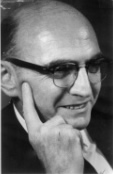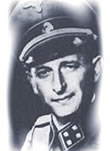
How did prosecutor Gideon Hausner view his role in prosecuting Nazi criminal Adolph Eichmann who supervised the systematic murder of six million Jews in Europe? What impact did the Jerusalem trial in 1961 have on the Jewish survivors who had to recall their torment when testifying in court?
The opening statement of Gideon Hausner in the Eichmann trial.
In this exclusive interview with Martha Deane of WOR TV on 1966, Gideon Hausner talked freely about his experience and the trial’s impact on the victims. IsraCast presents this dramatic interview by courtesy of Advocate Tami Hausner- Raveh, the daughter of Gideon Hausner.
Martha Deane of WOR TV interviewing Gideon Hausner (1966)
A : To speak to these people, to these tongue-tied people, with whom you lose very often the touch because they are not. they are not able to put into words, into proper shape, going through hell. They’ll never be again the same as they were before Hitler came there, and before the roof caved in on them. There is something traumatic in their make up which will never be good again. When you speak to them and you ask them to recount events, after a point they are logical and coherent, you understand everything, but from a certain point you talk through a fog. You lose contact. And to bring these people to tell the story – very often they would say: “oh, leave me alone, it comes anyway often enough in my nightmares. Why do I have to go there, into full limelight, and be cross examined… I don’t know. I don’t want to do it.” And then we had to persuade them it’s their duty. And sometimes it was the other way around. A fellow came along and would say: “I’ll tell you the whole story, from the beginning to end. You don’t need any more witnesses on this particular episode or place or time. I’ll tell you all about it”. Well, we didn’t want one person to tell it all because we wanted to bring a very wide cross-section of the people to tell the story. And that is why I brought judges, and writers, and housewives, and manual laborers, people from all walks of life who were there, who happened to be there, and every one, in his own language, from his own aspect, was telling what happened to him at some particular time which we wanted to be told.
Q: And each of these had to be in relation to orders issued by Adolf Eichmann. He was the man on trial.

A: Of course. Each one of them had to tell the effect of one of his activities, of one of the papers he signed, which… each one of them was tantamount to a death sentence for a thousand people, or two thousand people. Just in order to carry a train from Drancy to Auschwitz with 2400 deportees – I’m quoting from memory – was a death order for 2400 people.
Q: Signed by him.
A: Signed by him. Yes. So of course we brought, say, professor Georges Wellers of the Sorbonne University today, who was in Drancy, who was on this train, to tell how it was. How it looked. What it meant in human terms, this deportation order signed by a bureaucrat at his writing desk in Berlin.
Q: Mr. Hausner, I want to go back to something you said a few minutes ago. The testimony was not confined, nor is the book confined to what happened in, let’s say, a couple of places – Germany and Poland. It’s confined of what happened in all countries, really, in relation to this story. And I think you said, or you certainly implied, that the world pretty well refused to look at it.
A: More or less, yes.
Q: More or less closed its eyes on the whole thing until it was much too late, until six million were actually dead.
A: Yes.
Q: With two notable exceptions: the Finns and Denmark. Let’s talk about Finland and Denmark.
A: Let’s.
Q: Because as you say, people forget this – the big part of the story, and therefore I would assume that a lot of people have forgotten about Finland and Denmark in relation to this particular story, and it certainly is something that should never be forgotten because I think. I should not say what I think; we are talking about your book…
A: But I would love to know and your listeners would love to know what you think.
Q: I think what happens in Finland and Denmark does a way with the pat answer which says: “well, what could be done? It was too big for us”.
A: It is true. And what was done by simple, gray, ordinary, un-presumptuous people on the combated continent of Europe, people who abandoned their homes, abandoned family life, and went out of their way to hide Jews, to give them refuge and asylum, which was no mean feat at those days – these are, to my mind, the real heroes of this war because they rose to new heights of humanity while our politicians, as important as they were, displayed a great moral carelessness in the face of unprecedented disaster. Now, what happened in Finland was that a small nation, entirely at the mercy of Germany, because they were fighting Soviet Russia even before the Soviet-German war.
Q: They were attacked by Russia in 1939.
A: They were attacked by Russia, they kept the Russian giant back, and of course they joined the German onslaught on Russia, because Russia was their national enemy.
Q: They joined the Germans in 1941.
A: ’41, yes. When Germany declared war on Russia in 1941 they found themselves aliened with Germany. By the way, they never declared war on the United States, which is also characteristic. So, this little country, dependent on its supplies, on its very life, on Germany, said: we will not give the Jews. Himmler was furious. He went to Helsinki, he said – we will cut off your ration, you will starve if you don’t give us the Jews, this is part of the solution, it’s a political problem of first importance. You see, for the Germans it was as important to exterminate the Jews as to win the war. It can be proved today that these were twin purposes of equal importance, none taking precedence over the other.
Q: And there were 2000 Jews in Finland?
A: All together 2000 Jews.
Q: And they wanted them all turned over?
A: The Germans wanted them all turned over and Finland did not deliver the Jews to the very end. It also proves that a courageous stand on the part of even a satellite country had an effect and was practical.
Q: You have pointed out that it was ironic then, because those 2000 Jews found themselves fighting on the side of Germany against Russia.
A: There is always a sense that creeps down my spine when I come to think of it, that there were Jews, even in this conflict, who were bound to fight for their country of course, for Finland, but at the side of Germany against Soviet Russia, which is just an incredible quirk of history.
Q: Incredible quirk of international politics. How about Denmark, where there were 8000 Jews, weren’t there? I think there were 8000 all together, you said in your book, in Denmark which as everybody knows was overrun by the Germans in April of 1940. The king became a virtual prisoner and there was sabotage all over. And the Germans announced that they wanted all the Jews in Denmark turned over to them.
A: Yes, and when the king of Denmark came to know about it he said that he will not let the Germans do it. The whole story how it filtered through is quite a tale – I’m telling part of it in my book – and then a spontaneous reaction of the whole nation’s setting. Everybody was mobilized by the underground for a few days or weeks in order to clear the Jews from their homes, hide them for a while, and finally evacuate them through the waters between Denmark and Sweden and transport them into safety, to Sweden. Now, you had from university professors down to taxi drivers – everyone joining.
Q: But students and boy scouts, little boys.
A: Boy scouts, people serving as guides, guiding groups of refugees. Mind you, these were civilians, not soldiers. Women with babies in their arms being guided to the shores in the middle of the night, waiting for a signaling boat from the other shore, keeping watch whether the German police is not approaching, without a single mishap. This operation, which is called in history “small Dunkirk” – Dunkirk being the big evacuation of the German troops from occupied France. Small Dunkirk succeeded because a whole nation rose up against this vicious scheme, because, some of them even said, “we don’t do it because we love the Jews particularly, we just can’t stand the piggery of what these uniforms are doing”. That was the reaction.
Q: So within a very short space of time all 8000 Jews in Denmark had been moved to Sweden.
A: Almost all of them, with the exception of few very very aged or such who just by any chance were discovered, but not in the course of operations, they were discovered at their homes, you see, while hiding. The whole, I would say, operation of conducting people to the shores and evacuating them – this was totally successful. 457 persons I believe were deported to Theresienstadt by the Germans, and even then the Danes didn’t give in and wanted them back and fought a war with the International Red Cross about them, but that’s already a different part of the story.
Q: But those two countries, Finland and Denmark, are the. I guess the only bright spots in the whole book.
A: Yes, we were also trying to do it, Jews, at the time. We were trying to do something. Of course, in what was then Palestine we were locked in a conflict with the Arabs, a conflict with the British, we were only few in numbers – 650,000. We trained several hundreds parachuters whom we hoped the British will eventually drop in the Ghettos. Later on, for political reasons, they cut the number to one tenth of the original contingent. And still, we tried to do a tiny little bit. Whether we did enough is a question which will continue to plague our national consciousness too.
Q: But you did all that you could do.
A: Well, I would like to believe we have, but “all” is a very vague term. There was always a possibility to do more. A notable Jewish leader like Dr. Nachum Goldman today, goes up on public platforms and admits he was guilty of letting the democracies fight the war in peace and guilty of too much complacency at the time. He said we should have really stopped daily life in London and Washington when our people were being exterminated. After all, for whom was the war fought? Not for them? They were written off? Why? Didn’t they do their share for Europe’s life, culture, civilization? Weren’t they entitled to live? So you see, this is something which will live with us to the rest of our days, this problem – whether we did all.
Q: Yes, but how do you think other people, who know they didn’t do all – you have a question of whether you did all, a great many of us have the question of: why didn’t we do anything?
A: Well, I’m not a moralist.
Q: I know. You didn’t say that, I did.
A: I’m not trying to.
Q: You didn’t even imply it, Sir.
A: No, I just put the facts on record, and I leave the rest to the reader.
Q: Dr. Hausner – you told me not to call you Dr., you said to call you Mister.
A: That’s right, I’m just an MA, so I.
Q: You said your title is no longer Attorney General in Israel; you are a Member of Parliament in Israel now. To go back to some other things, there are several other things in the book I want to have time to bring up, so let me, if you don’t mind, just shop quickly for my sponsors and then I’ll get back to something else in the book, and if there is anything you particularly want to bring up that I haven’t, just do feel free to do so. This is Martha Deane program, WOR New York. We get back to our guest, and our guest this morning is Gideon Hausner. He was Attorney General of the State of Israel and the chief prosecutor, the man who prosecuted Adolph Eichmann for crimes against the Jews of Europe, who prosecuted him, and as everybody knows Adolph Eichmann was convicted, as Mr. Hausner told us a few minutes ago, on all 15 specific counts. This book, the book I’ve been telling you about, which I have enjoyed so much and I recommend it to everybody. It’s fascinating reading; the man is a writer as well as a lawyer. It’s a very fine job. Justice in Jerusalem, published by Harper & Row next Wednesday, May 25 th. If there is anything, Mr. Hausner, that I haven’t brought up I wish you would, and if not, I have a couple of things I want to go into.
A: Let’s go into your things. I gave a great deal of thought to the last chapter in my book – my own reflections three years after the trial, because you see, once the drama of it is over, the strain is out, the question is: what are the lasting effects? what will remain in the human memory? Did we succeed in making any dent in the armor of human complacence? Did we or didn’t we? Was there any innovation through all this? I give my reflections on three different levels: one – the international scenery, second – Germany and third – Jewish life. I will say perhaps very briefly something about the third because I think it’s important. I keep telling our youth, and I am still involved in this as an educational project, that we should derive encouragement and hope from what happened because here we were delivered into the hands of the biggest military power on earth. Only cooperation between both east and west was successful in bringing Hitler down. The Jews were delivered to his mercy. He was implacable in his enmity toward them. And still, we survived this onslaught. Hitlerism is today a shameful concept in history. We have our own state, we go on creating, we have a new generation, we have universities, for the books which were burned there we published new ones, and although we are still crippled we are the only nation in the world which didn’t make up its pre-war losses, its war losses, we still didn’t reach the pre-war figure of 17.5 million, we are still lingering behind with 13 million today all over the world.
Q: 13 million.
A: Jews, all over the world.
Q: All together?
A: All together. We were 17.5 in ’39. This is the only nation in the world which didn’t heal its war wounds, because the population explosion of the ’50 took care of the gap in Japan, in Soviet Russia, in Germany, everywhere. Germany is today, both parts of it, much greater in numbers than it used to be in ’39. So we are the only exception. But we survived it, and that is the most important thing. And this gives, I would say, new hope and new validity to our belief that Jews will survive their persecutors, as they have from antiquity.
Q: From antiquity.
A: That’s right. From the days of Pharaoh in Egypt.
Q : A long history of survival, isn’t it?
A : Yes. Mile-stoned with a lot of tears and suffering. But still, it is a unique prize from history: survival. No other nation can burst it. Survival directly from ancient times to today.
Q : Mr. Hausner, there are other.. just to give our listeners a little more idea of the book. Not only is this the story of Hitler and Germany’s persecution of the Jews in Europe, but it is the story of the persecution of other people of other faiths, and I am not talking about soldiers and military, I’m talking about civilians.
A : That’s right. I thought it was a valid comparison in order to evaluate the behavior of the Jews, who were enured beyond the walls of the Ghettos. To compare – how did others behave in similar circumstances and situations? Because Hitler had not only the Jews, he had the polish under his heel, he had.
Q : You said, 40,000 hostages the German took in Poland.
A : The Polish, the prisoners of war and the civilian populations of so many occupied countries. I have made this the subject of my, I would say, biggest and most difficult for me chapter in the book, which I call Under the Heel, making this comparison.
Q : I wish I had more time. I just have time to thank you for coming and I do appreciate it, Mr. Hausner.
A : Thank you, Ms. Deane, it was a pleasure talking to you.
 Transcript by Dar Translations
Transcript by Dar Translations
972-2-6414722 | dar_doc@smile.net.il




